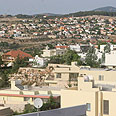
Jews yes, Arabs no. Kfar Vradim
צילום: אלעד גרשגורן
No tax breaks for Arabs
High Court ruled tax breaks based on location discriminate against Arab communities but government ignored ruling
Heads of local councils in the Arab sector are protesting against a government decision that amounts to discrimination when compared to their Jewish counterparts along the State's borders.
Such Jewish communities receive tax benefits, and despite a High Court ruling that the amendment to the income tax act is unequal, the government has still not submitted an updated list of settlements included in the tax benefits. The end of last November was the deadline for the government's response to the ruling, and voices in the Arab sector are accusing the government of a racist decision.
In September, the High Court ruled that tax breaks based on location are not egalitarian or legal, because the list of communities slated to receive the benefits does not include even a single Arab town.
"There is ongoing discrimination," said Mahdi Nasser-Eldin, head of the Kisra-Sumei Regional Council, north of Carmiel. "We are closer to the border than Jewish towns, and nobody explains why the Druze community of Kisra-Sumei does not get (the tax breaks) while Kfar Vradim, which is further than us, does."
"The Prime Minister's Office treats us with contempt," he adds.
"I am not in favor of reducing (taxes) for any resident of the north," said Qassim Awwad, head of the Mazra'a Regional Council, south of Nahariya. "But unfortunately, the government makes no effort to respond to the demands of the Arab residents, seeking instead to make life comfortable for the Jewish residents."
In 2002 Awwad petitioned the High Court but has still not received any ruling. "I took aerial photos and proved to the court that there are Jewish communities south of the village which get the tax benefits, yet one of the basic criteria is distance from the border."
Awwad is also active in the Knesset Finance Committee in his efforts to get the law amended. "The Finance Committee says it can't make the decision, because it depends on the committee on border settlements and on the government," he said. "The High Court says the government and Knesset need to legislate."
Awwad is already showing signs of despair in the bureaucracy. "If the High Court can't decide on these issues and no decision can be made via politics, then I'll try turning to God," he said.
'Residents of some other kind'
In the south, communities close to the border also receive tax breaks, but Rahat Mayor Faiz Abu Sahiban is sure the root of the problem is discrimination.
"The State needs to take a good look at how it treats its Bedouin population," he said. "Rahat should get what they get in Sderot, Beersheba, Arad and Dimona, otherwise its just discrimination and racism, and it seems we're not Negev residents but residents of some other kind."
Abu Sahiban says the government has abandoned the Bedouin population and fails to provide employment.
"They say there's vandalism among the Bedouin, but this is because there's no employment," he said. "It's the State which causes the lack of employment. We want the State to provide employment so we can be financially independent."
"The prime minister's stance does not surprise us," said Attorney Sawsan Zaher from Adalah, the Legal Center for Arab Minority Rights in Israel. "We see budgetary discrimination in many cases. It is very saddening that the government has no political will to apply the High Court ruling, because it must be applied."
The Prime Minister's Office has not yet responded.
- Follow Ynetnews on Facebook










